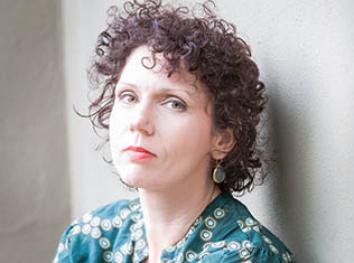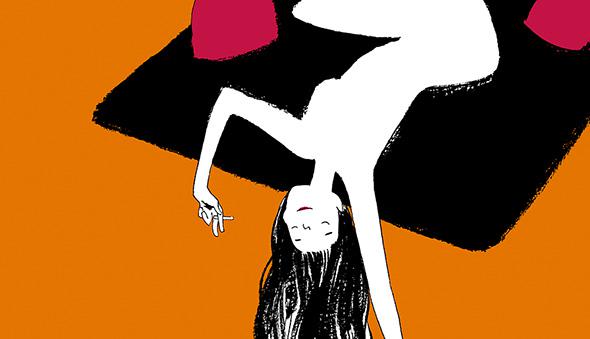In the great debate over protagonist likability, I have always fallen firmly on the side of defending the pleasures of indefensible characters. Bring on the prickly, the strange, the cruel, the self-destructive! I don’t read books to make friends.
But Hausfrau, the debut novel by poet Jill Alexander Essbaum, challenged my stance on the issue. The novel’s heroine is exhausting. An American woman married to a wealthy, dashing, faithful Swiss man, Anna Benz has three beautiful children, an elegant house near Zürich, no need to work, and a mother-in-law who babysits on demand. She is stylish and slim. Handsome, interesting men flirt with her seemingly everywhere she goes. Naturally, she is miserable.
There is a problem, you see: Anna is a wife and mother in a novel, and therefore she suffers from the generalized ennui that is a longtime epidemic among her peers in Western literature. Sadly, Anna is only “more or less” in love with her banker husband, Bruno. She doesn’t have many friends, seemingly by choice. She doesn’t like springtime, because she is “saddened by flux.” After nine years in Switzerland, she is only beginning to make a real effort to learn to speak German. Poor Anna! And so, without much agonizing, she has entered into a series of lusty affairs that present themselves to her almost every time she leaves the house.
Bad choices make for good plots. But there’s something about Anna that is not only unsympathetic, but unconvincing. Other than a past interest in sewing, she doesn’t seem to have any hobbies. She doesn’t read. She doesn’t follow the news, or spend any time online. She takes long walks and thinks things like “Shame’s the shadow of love.” She is prone to on-the-nose symbolic gestures like tossing her cellphone in the Limmat River and riding the train for hours on a whim.
Then again, Hausfrau itself is prone to on-the-nose symbolism. Not only is one of Anna’s lovers a “pyrologist,” but the novel wields a blowtorch to draw attention to the deeper connotations of his job: “An ordinary flame’s hottest point cannot always be seen,” and so on (and on). Anna’s idea of pillow talk with her pyrologist is to murmur things like, “Tell me about spontaneous human combustion.” Another time, as her husband lies smiling beside her in the glow of a fading orgasm, she whispers, “Bruno, what is the purpose of pain?” Do real people, even depressed expats, really talk this way?
Nonetheless, I found myself staying up late with Hausfrau and lingering in bed in the morning to pick up where I left off. Somehow the novel as a whole is as propulsive as Anna is listless. Watching a car crash—even an infuriatingly avoidable one—is reliably irresistible, and Anna’s Zürich is a wonderfully specific place. And although Anna doesn’t seem to particularly enjoy all the athletic sex she’s having with her generous lovers, Essbaum is very good at writing about it. So I was eager to keep reading Hausfrau even as I frequently wanted to slap the frau in the haus.
This is a novel about an unfaithful wife named Anna who is drawn to trains, and so the comparisons to a certain 19th-century Russian novel are unavoidable. But those similarities only serve to illustrate the much-discussed difficulties of the “marriage plot” in the age of female emancipation. Anna Karenina is truly stuck: Financially, legally, socially, she cannot escape Karenin. Anna Benz, on the other hand, is free to do just about anything she wants. From Sarah Pierce in Tom Perrotta’s Little Children to Patty Berglund in Jonathan Franzen’s Freedom, Anna and her fellow heirs of Madame Bovary suggest that 21st-century marriage and motherhood are just as miserable as the 19th-century version. When an early passage ends with the statement “Anna didn’t even have a bank account,” it might as well be set to an ominous “dun dun DUN.” But why doesn’t she … get a bank account? Or a driver’s license? Or a therapist, instead of her Jungian psychoanalyst? Or a divorce? Emotional difficulties would ensue, to be sure, but her present emotional difficulties are already apparently crushing.

Photo by Megan Sembera Peters
And what exactly are those emotional difficulties? Bruno is cold and disengaged; I would not want to be married to him. But he is a good father and a reasonable man. It’s never clear why Anna can’t be frank with him about her unhappiness. Instead she mopes around resenting him and pitying herself. One morning, after a night of mutually orgasmic love-making, she spirals into desolation when he gently rebuffs her overture for a second round at the breakfast table. “The brief vacation from heartbreak made the desolation that remained all the more acute.”
There is no mention of Anna ever having had a career back in America, and no suggestion that she has considered working in Zürich. Child care does not seem to be an obstacle. The Benzes are well-off, and anyway, her mother-in-law watches her children while Anna traipses to German class and then roams the city pursuing her affairs.
I would argue none of this would be so annoying if Essbaum would simply wink at her readers and let us know that we are meant to be rolling our eyes at least once in a while. In a flash of rare straightforwardness, her analyst tells Anna, “You move like a refugee in a war ghetto when, truly, you have every Allied power at your command. There is no reason to live like this.” But the moment passes, and soon we are submerged again in Anna’s passivity and misery, and apparently expected to take it very, very seriously.
Happy families, and happy people, get a bad rap. They are clueless Pollyannas and cheery conformists, better suited to “chick lit” than the pages of literary fiction. According to the now-clichéd opening lines to Anna Karenina, they are all alike. But Hausfrau is a reminder that unhappy people can be awfully tedious, too.
—
Hausfrau by Jill Alexander Essbaum. Random House.
See all the pieces in this month’s Slate Book Review.
Sign up for the Slate Book Review monthly newsletter.
